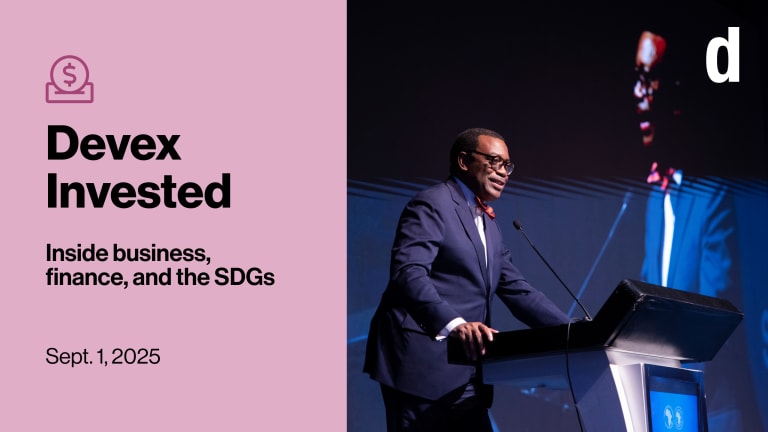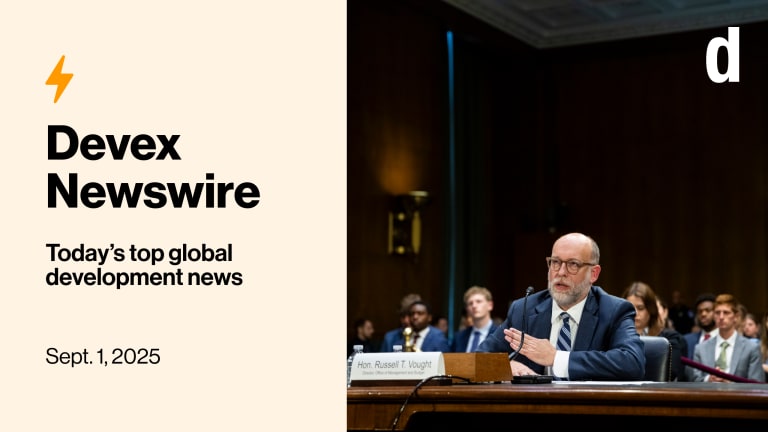French development aid: ‘Phase of pause before a grand revival’
President François Hollande has initiated several interesting changes meant to clarify as well as modernize his France’s foreign aid policy. Here are some of the most noteworthy developments and trends so far.
In April 2014, President François Hollande’s cabinet reshuffle brought upon considerable structural as well as policy changes in France. But in the aid community, all eyes were turned toward an arrangement that many struggled to understand: the merging of development and francophonie portfolios under one secretary of state, Annick Girardin. Although Hollande’s administration has defended the move as a mere attempt to streamline bureaucracy, the change can be seen as indicating France’s broader determination to reform its development policy — a promise Hollande consistently made throughout his presidential campaign. Halfway into his presidential tenure, Hollande has initiated several interesting changes meant to clarify as well as modernize his country’s foreign aid policy. Here are some of the most noteworthy developments and trends so far. Strong commitment to the post-2015 agenda With the Millennium Development Goals coming to a close, the definition of a post-2015 agenda is pivotal to France’s revamped development policy. In September 2013, a close collaboration with more than 60 French nongovernmental organizations led the government to issue a position paper presenting its approach on the next global development agenda, centered on combining Sustainable Development Goals with MDG achievements. Three core ideas structure France’s stance on the post-2015 agenda: that all aspects of sustainability be placed at the heart of the agenda; that a more comprehensive view of development, which goes beyond basic needs, be upheld; and that a rights-based approach, which ensures accountability on human rights across all goals, be promoted. Regarding scope and implementation, France calls for a post-2015 agenda that would be universal — with targets and goals relevant to all states — yet adaptable to the socio-economic realities of each country. This would allow national governments to choose the most appropriate goals with respect to their situation, all the while preserving an international follow-up framework. “The rise of social inequalities is a common concern shared both by countries in the ‘global north’ and those in the ‘global south’,” Jean-Marc Châtaigner, deputy director general for global affairs development and partnerships at the French Ministry of Foreign Affairs, told Devex in an exclusive interview during OECD Development week early July. “France’s position is to have a universal agenda, which would be … easy-to-follow, with measurable objectives and targets.” Finally, in a bid to make the post-2015 agenda more inclusive, the use of more diversified financing instruments and strategies is put forward. This would ensure the relevance of the agenda to all development partners — may they be traditional donors, private sector actors or philanthropic foundations. Major drive toward increased transparency French aid is notorious for its lack of consistency and traceability. In the 2013 Aid Transparency Index, the French development agency, or AFD, ranked 49th out of 72 donors. Since his election as president, Hollande has ramped up efforts to increase French aid transparency. One significant achievement is the recent adoption by parliament of a programming law on development, which includes a series of measures to improve aid effectiveness and transparency. The first of its kind for the French republic, the law is also a road map for French development policy. Many in the nonprofit sector welcomed the law, hailing it as an important step toward enhanced accountability of public aid flows. Initially limited to the approval of the annual budget, the parliament’s powers of oversight have been extended, with members of parliament now enjoying the authority to debate and determine the orientations, allocations and recipients of France’s official development assistance through biennial reports. The law also calls on French aid to use and publish more data and performance indicators. Through special websites, people can now access the list of French-funded projects, as is already the case with Mali. “France is making an unprecedented effort to publicize its projects and programs,” Châtaigner highlighted. “We have entered a new era of transparency, which is almost one of participative evaluation of projects.” Emphasis on differentiated partnerships France’s new development law further establishes what it calls “differentiated partnerships” as the backbone of its aid interventions. Similar to its position on the post-2015 agenda, France wants to increase flexibility as well as impact by adapting its aid objectives and instruments to the realities of each partner country. The world’s poorest countries — the bulk of which are located in sub-Saharan Africa, where France enjoys longstanding cultural and linguistic ties with former colonies — are unsurprisingly enunciated as the main recipients of French grants. In fact, the government is set to allocate half of its grants as well as two-thirds of AFD’s to the region. Overall, sub-Saharan Africa as well as neighboring countries of the South and East of the Mediterranean are a priority for French ODA. France will concentrate 85 percent of its overseas assistance to these countries, but will mobilize a mix of funding instruments — including donations, budget support, loans, equity investments and innovative funding mechanisms. In the rest of the world — specifically Asia, Latin America and the Caribbean, where most countries are fast-growing middle-income economies — French development assistance will primarily be in the form of loans, all the while being enshrined within economic partnerships. In search of more innovative financing Innovative development financing models — instruments that generate additional funds or propose pioneering financing solutions to development problems — is a central underlying trend of France’s outlook on aid. Under Nicolas Sarkozy’s presidency, parliament drafted a law on financial transaction taxes and Sarkozy later pledged to allocate 10 percent of revenue to ODA. He also led France into being one of the top contributors to UNITAID and the International Finance Facility for Immunisation, two innovative financing mechanisms for global health. Other innovative instruments — such as the solidarity tax on airline tickets and highly concessional countercyclical loans — were similarly set up. In line with the former administration, Châtaignier stressed that the Hollande government will continue to look for innovative financing opportunities, as results have been particularly encouraging so far. “We are among the countries that have implemented the tax on airline tickets that finances UNITAID, and we have mobilized 6 billion euros ($8.2 billion) between 2006 and 2012 — this is not negligible.” Against such a seemingly positive backdrop, however, some NGOs point out that France’s new framework on development policy “minimizes” the role of innovative financing. “The text does not specify that these funds, especially the tax on financial transactions, should only be used to increase the overall effort of France for development,” underlined Friederike Röder, director of ONE France. “Because of this lack of accuracy, the risk is high to see the financial transaction taxes only fill up the holes of a reduced budget.” Even more worrying is the fact that financial transaction taxes have so far raised much less than expected. Between August 2012 and August 2013, revenue amounted to only 700 million euros — a far cry from government forecasts of 1.6 billion euros. And the decision of Hollande’s cabinet to increase the international solidarity tax to 15 percent in 2014 might not be able to do the trick. A bleak future ahead? Although France continues to be among the world’s top donors, ranking fifth after Japan, the future of French development aid looks grim. The Organization for Economic Cooperation Development recently reported a 10 percent drop in French development aid between 2012 and 2013, with ODA falling from 0.45 to 0.41 percent of gross national income. The decrease is the third-largest reduction of official development assistance in the world, after Portugal and Canada. This negative trend is likely to continue in 2014, with the government announcing, as recently as June, a further decrease of 73 million euros in public development aid. And the new framework for French development is unlikely to help, as it fails to foresee any budgetary programming. In light of such budgetary constraints, reaching the U.N. target of dedicating 0.7 percent of its GNI to development aid by 2015 has fallen off the French government’s radar — for the time being at least. In March 2013, Hollande announced that France would resume its commitment once growth is restored and the economy is back on track. “We should stick to the speech given by the president of the republic,” confirmed Châtaignier. “But France will resume its commitment as soon as the conditions allow it … we are in a phase of pause before a grand revival.” Check out more insights and analysis provided to hundreds of Executive Members worldwide, and subscribe to the Development Insider to receive the latest news, trends and policies that influence your organization.
In April 2014, President François Hollande’s cabinet reshuffle brought upon considerable structural as well as policy changes in France. But in the aid community, all eyes were turned toward an arrangement that many struggled to understand: the merging of development and francophonie portfolios under one secretary of state, Annick Girardin.
Although Hollande’s administration has defended the move as a mere attempt to streamline bureaucracy, the change can be seen as indicating France’s broader determination to reform its development policy — a promise Hollande consistently made throughout his presidential campaign.
Halfway into his presidential tenure, Hollande has initiated several interesting changes meant to clarify as well as modernize his country’s foreign aid policy. Here are some of the most noteworthy developments and trends so far.
This story is forDevex Promembers
Unlock this story now with a 15-day free trial of Devex Pro.
With a Devex Pro subscription you'll get access to deeper analysis and exclusive insights from our reporters and analysts.
Start my free trialRequest a group subscription Printing articles to share with others is a breach of our terms and conditions and copyright policy. Please use the sharing options on the left side of the article. Devex Pro members may share up to 10 articles per month using the Pro share tool ( ).
Manola De Vos is an Engagement Lead for Devex’s Analytics team in Manila. She leads and designs customized research and analysis for some of the world’s most well-respected organizations, providing the solutions and data they need to grow their partner base, work more efficiently, and drive lasting results. Prior to joining Devex, Manola worked in conflict analysis and political affairs for the United Nations, International Crisis Group and the EU.








